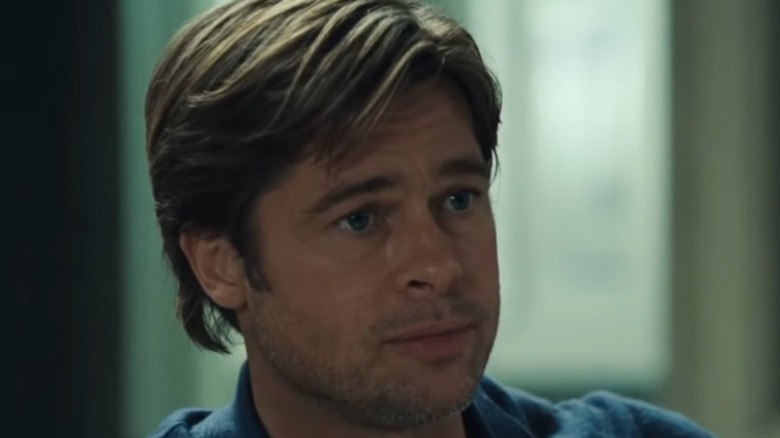
Bennett Miller’s “Moneyball” is a lovely lie of a film. It’s the Hollywood version of Michael Lewis’ already-massaging-the-truth book about Billy Beane’s epiphanic Major League Baseball success with sabermetrics (a statistics-based measurement of a player’s value to the team) in rebuilding a partially gutted-by-free-agency Oakland Athletics team after the departure of their best offensive players. In Miller’s film, unorthodox general manager Beane (Brad Pitt) hires stat nerd Peter Brand (based on front office guru Paul DePodesta and played by Jonah Hill) to help him build a contender for the cash-strapped A’s by stocking their lineup with statistically productive players cast off or ignored by the rest of the league.
In the end, it works: the A’s go on a (statistically unpredictable) 20-game win streak at the end of the season, win the American League West and go to the American League Division Series where they’re defeated by the Minnesota Twins. All at once, MLB realizes sabermetrics is the future, prompting the cash-flush Boston Red Sox to offer Beane their GM job. In the bittersweet finale, Beane wins and loses. Sabermetrics works, but now the big money teams will use it to place small market clubs at an even greater advantage.
The truth is that Beane’s A’s went on that miraculous run because they had two of the best starting pitchers in baseball (Barry Zito and Tim Hudson) and another arguably in the top 20 (Mark Mulder). These three players are not in Miller’s “Moneyball.” Their presence would greatly diminish the film’s underdog narrative.
This may also be why Miller made the film for Sony instead of Steven Soderbergh, whose unorthodox approach ironically clashed with the studio’s desire for a more conventional film. That “Moneyball” happened at all is a minor miracle (it belongs to a rare class of sports movie we’ve written about here at /Film), one worked by the uber-desirable Mr. Pitt.

When Sony acquired Lewis’ bestseller “Moneyball” in 2004, it initially envisioned Pitt starring in a film directed by David Frankel (pre-“The Devil Wears Prada”) and written by Academy Award winner Steven Zaillian (“Schindler’s List”). Frankel eventually walked, leaving the director’s chair nice and warm for frequent Pitt collaborator Steven Soderbergh.
What seemed like a grand slam hire for Sony quickly turned into a contentious behind-the-scenes nightmare. Soderbergh’s approach to the “Moneyball” involved comedian Demetri Martin playing DePodesta, with David Justice and Scott Hattenberg (key members of that 2002 A’s team) playing themselves. Soderbergh also wanted to intersperse interviews with former baseball players like Darryl Strawberry and Lenny Dykstra throughout the film. He believed these unusual elements would allow him to inundate viewers with a lot of dry statistical information in an entertaining way (he would employ the interview device eight years later in his seemingly forgotten pro basketball drama “High Flying Bird”).
Sony honcho Amy Pascal didn’t get it, and was particularly displeased when Soderbergh turned in a rewrite a week prior to the start of shooting that went, in the studio’s opinion, too heavy on “baseball details.” After a brief turnaround period that saw Paramount and Warner Bros. decline to pick up the project, a flustered Soderbergh opted to bolt rather than water down his vision.
Whither “Moneyball?” As Pitt told The Hollywood Reporter in 2012, “It was dead.” Sony could’ve cut bait and swallowed the development costs, but Pitt was too invested to let that happen. So he got to work salvaging a listing ship.

800-pound gorilla (and reportedly abusive) producer Scott Rudin credited the existence of “Moneyball” the movie solely to Pitt: “There would be no ‘Moneyball’ without him. He saved it single-handedly, and he deserves the credit for its existing at all.”
After Miller stepped in for Soderbergh, Aaron Sorkin joined Zaillian for a rewrite (which Sorkin’s fingerprints are all over at least dialogue-wise), and they combined to deliver some exemplary, genuinely smart Hollywood entertainment.
But it was Pitt, who also produced, that saved the day. Why did he do it? As he told The Guardian in 2012:
“Well, I just worked on it for so damn long. I’ve been on that end of the experience a couple of times. The main character is a guy who’s been devalued by the sport and is playing what he called an unfair game. And they go up against conventional wisdom and get called heretics in the process. At the end of the day this guy who’s trying to win games is really trying to find his own values. Come on, man, that’s good stuff.”
It really is, and it’s why, even though I know the film — which basically excludes the vital contributions of the three staff aces and downplays the pivotal offensive production of Eric Chavez and Miguel Tejada (who won the freaking American League MVP that year — is a fairy tale, I would happily drop everything and watch it again right this second. If you asked me to single out Pitt’s definitive star turn (though not his best movie per se), I would point to “Moneyball.” Yes, Hill and Philip Seymour Hoffman (as manager Art Howe) offer spectacular support, but this film is a gleaming, humming Pitt vehicle. It is a joy to behold.
And hardly the only irresistible lie Hollywood has told over the last century.



